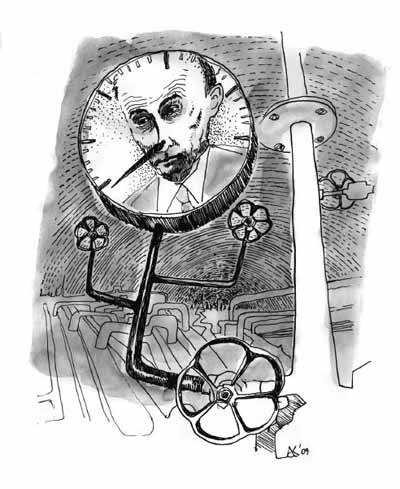Gas Wars: Russia Strikes Back but Poland Escapes
Amidst the tension and insecurity that spread throughout Eastern and Central Europe during the recently resolved Russian-Ukrainian gas dispute, Poland proved itself as one of the countries less vulnerable to Russia’s economic and political demonstration of power.
Though also having reported substantial drops in gas supplies, Poland was well prepared and protected, as it continued to receive 84 percent of its gas imports from Russia via the Yamal-Europe pipeline running through Belarus.
As Joanna Zakrzewska, spokeswoman for the Polish Oil and Gas Company PGNiG, informed the Krakow Post on January 19th, “Prior to the suspension of deliveries through the transfer point in Drozdowice on the Polish-Ukrainian border, PGNiG redirected part of the gas, 5 million cubic metres per day, to Wysokoje on the Polish-Belarus border. At this time we have 16 percent less gas flowing to Poland from the east than expected.”
Poland managed to compensate for the decline by utilising stored gas that had been accumulated beforehand. “Since Russia notified us in advance about possible disturbances in gas deliveries, making use of an early warning mechanism, we were able to conserve supplies. Thanks to this, at the start of the 2009, our storage facilities were filled at around 90 percent. At the moment their level is still over 65 percent,” Zakrzewska stated.
As the winter grew harsher, hitting temperatures as low as minus 30 degrees Celsius, daily usage of gas in Poland increased from 45 million cubic metres to 55 million cubic metres. The Polish government responded to the rise in demand by granting approval of the action to reduce gas deliveries to the largest industrial recipients.
Accordingly, on January 7th, gas supplies were diminished for two Polish plants, PKN Orlen and ZA Puławy. The companies compensated for the restrictions by drawing from their own gas supplies, which they are required to maintain.
Triggered by a disagreement on gas prices and failure on the part of Ukraine to settle a $600 million late fee demanded by Russia, the crisis escalated on January 1st, when Russia’s state-controlled gas monopoly, Gazprom, cut off supplies to Ukraine. Moreover, Russia accused Ukraine of siphoning off large quantities of gas destined for European customers.
In the midst of the gas crisis, Ukrainian President Viktor Yushchenko met with President Lech Kaczyński in Wisła, Poland, on January 14th to discuss his propositions for Russia and the European Commission. During the conference, Yushchenko maintained that Kiev did not steal a single cubic metre of gas from Russia and did not take any actions that would interrupt deliveries to Europe.
Nevertheless, the repercussions of the dispute were felt across Europe, which depends on Russia for one quarter of its natural gas. In turn, 80 percent of the Russian gas delivered flows via Ukraine, while smaller pipelines run through Belarus and Turkey.
Among the countries that suffered the most harm as a result of the gas war was Bulgaria, with 92 percent of its gas consumption supplied by Russia via Ukraine and no access to alternative gas routes. In addition, Slovakia declared a state of emergency, ordering a thousand companies throughout the country to reduce gas consumption so that homes, hospitals and schools could obtain heat.
The gas crisis not only confirmed Europe’s strong dependence on Russia, but also demonstrated its unity, as individual countries assisted others by delivering gas supplies. Croatia, for instance, received gas deliveries from Germany and Italy, while Slovenia drew on supplies from Austria. Similarly, in response to a condition proposed by Russia, Poland was ready to participate in the setting up of a supervisory commission, having received consent from the EU to send Polish experts to monitor the transport of Russian gas via Ukraine.
As Polish Minister of Foreign Affairs Radoslaw Sikorski remarked during an interview on TVN24, “Poland wants to present itself as a reliable transit country.” Emphasising that the Yamal pipeline works at capacity, Sikorski supports the idea of a second link to it rather than passing a pipeline under the Baltic Sea, a far more expensive option.
On January 19th, Gazprom and Ukraine’s Naftogaz signed a new contract, agreeing that Ukraine will pay the European market price, $450 per 1000 cubic metres, but with a 20 percent discount until 2010. According to Ukrainian Prime Minister Yulia Tymoshenko, the reduced rate will allow Ukraine to switch to market prices smoothly. In exchange, Ukraine will continue to charge Russia the same transit rate as in 2008 until the end of the year. Gas flows toward Europe through Ukrainian pipelines resumed the following day and industrial limitations were lifted.


Pingback: What Eastern Europe Thinks about Globalization | Globalization101